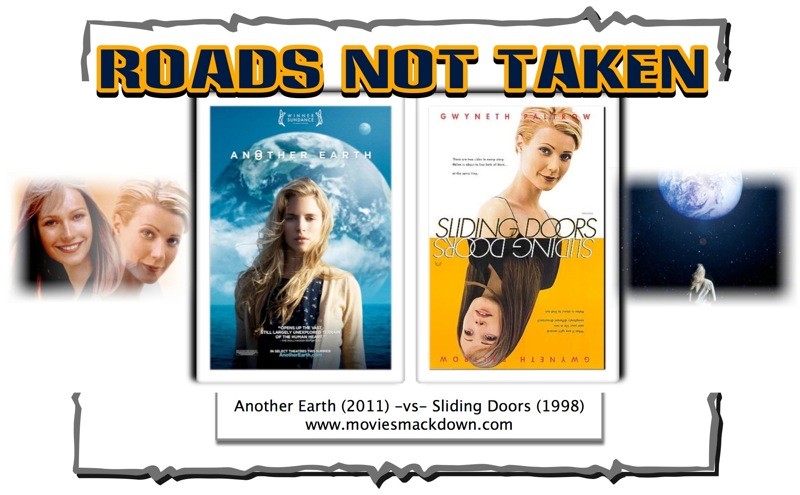
 The Smackdown
The Smackdown
You’re not actually reading this. In fact, you’re living in an alternate world, where all your dreams have come true; you’re together with the love of your life; and you’re incurably rich. No, wait… nirvana is not all it’s cracked up to be. Get back here and finish this Smackdown. We have a winner to determine.
Alternate worlds and parallel lives are the themes here, with moody, sci-fi indie Another Earth is pitted against the 1998 “what if” romantic dramedy, Sliding Doors. Â Both concern heroines who have the chance to experience a better life. In the case of our just-released challenger, troubled protagonist Rhoda (Brit Marling, who also co-produced and co-wrote the film with writer-director Mike Cahill) gets a one-in-a-million shot at visiting a newly discovered planet. This world looks very Earth-like and seems to be inhabited by people who are… well, doubles of ourselves. As for Sliding Doors, our girl Helen (Gwyneth Paltrow, in an early starring role) is a bright young professional freshly fired from her job. As if that weren’t painful enough, she’s got a shiftless, philandering boyfriend, Gerry (John Lynch) to come home to. If anyone’s in need of a different life on a more accommodating plane of existence, it’s she.
Two Helens, two Rhodas, two Earths, two fates. This is almost turning into a tag-team match. But at the end of the day, it can only be one on one. Alternates, go to your corners; the Smackdown begins!
[singlepic id=1084 w=320 h=240 float=right]
The Challenger
Another Earth conveniently provides its key plot device with its title. Scientists discover that there exists, yes, another Earth, and in the first few scenes we see it live and in person, a big turquoise globe looming in the sky. Young science geek Rhoda is mightily impressed with the newly found planet, so much so that she stares at it while driving. Inconveniently, this leads to her slamming into a car occupied by John Burroughs (William Mapother, who played Ethan in Lost, the TV series version of parallel universes), killing his wife, son and unborn child, and landing him in a coma for several years.
Rhoda eventually seeks out Burroughs to apologize, but he’s unaware of who she is, and she can’t find the courage to come clean. Instead, she tidies up in a much more quotidian (not to mention metaphorical) way, pretending she’s an employee of a cleaning service. This gives her the excuse she needs to be around and to assuage her guilt, and (if she ever finds the courage) eventually to admit that she caused his family’s demise.
Meanwhile, scientists discover that Earth-the-sequel is inhabited by alternate versions of ourselves and perhaps our families, and Rhoda unexpectedly wins a contest for a ticket on the first passenger flight to the mirror planet. She now has a real shot at redemption, which involves giving Burroughs a chance to reunite with his lost loved ones.
[singlepic id=1073 w=320 h=240 float=right]
The Defending Champion
Like its rival, Sliding Doors’ main plot device is right in its title. Said doors belong to a train on London’s underground that mark the division between the what if of protagonist Helen’s life and the what is of her current existence. Before her moment in the Tube, she’s an up and coming young PR executive — that is, until she’s late for work One Final Time and unceremoniously given a pink slip. Distressed and upset, she heads back to the train to go home.
This is where our plot device takes off. Regular Helen just misses the train, while Alternate Helen grabs those sliding doors just in time. We follow both as their fates diverge: Alternate Helen returns home early to catch Gerry in flagrante much delicto with bitchy American businesswoman Lydia (Jeanne Tripplehorn). Helen summarily divests herself of her philandering mate and eventually replaces him with James (John Hannah), a cheerful, just-short-of- annoying Scot she met on that fateful train following an initial encounter in an elevator earlier in the day.
Meanwhile, since Regular Helen missed that train, she doesn’t meet James that fateful second time and returns home later — after Lydia has left the apartment and the day’s cheating has been done. As a result, Regular Helen continues as usual with the philandering Gerry, who’s never going to finish his novel, probably because he’s so distracted having sex with Lydia. Ultimately, the effects of the affair land both Helens in the hospital, where one passes away and the other happens upon James in a new elevator encounter. Sliding Doors ends somewhat ambiguously, but since its theme is romance and positive change, we can safely assume our leading lady’s fate is a happy one.
The Scorecard
Both movies stay true to their themes and maintain their respective tones well. Sliding Doors never wanders too far from its romantic core, and despite the tribulations of the two Helens, the mood is light, the humor keeps flowing, and by the end we’re assured that she (they?) will ultimately be okay. Another Earth is considerably moodier, effectively portraying the damaged soul that is Rhoda and her torturous personal quest for redemption.
Of the two, the new film scores a few more points for originality. The concept of a second Earth isn’t unique, but it feels at least a little fresh when blended with the low-budget approach and indie sensibility of the movie. Additionally, using the central story device to illuminate Rhoda’s character works effectively, particularly for a character as closed and intellectual as she is. In Sliding Doors, the only conceit that feels relatively different is the diverging fates of the lead character and the deftness with which writer-director Peter Howitt interweaves her two stories. Otherwise, it’s basically two competent yet unexceptional comedy/melodramas. Once a pregnancy or two is introduced into the twin stories towards the end, you can feel the movie straining to build stakes for its protagonist.
Additionally, Paltrow’s Helen is cute and likable, however not otherwise distinguished. The actress gets the clipped tones and clean diction of the high-bred London accent right, but perhaps as a result, the performance seems technical rather than instinctive. Her character is a touch too cold and bland to be as compelling as we need a romantic dramedy heroine to be. In contrast, Another Earth‘s Rhoda is convincingly portrayed as smart and troubled, yet good-hearted at the core. As a result, she’s more sympathetic than her convincingly English counterpart.
The Decision
Neither one of these films is a classic of its genre. Both feel a touch labored, with plot turns that feel like inventions of screenwriters serving their story rather than organic developments (the pregnancy of the Helens; Rhoda winning the space ride ticket). Of the two, Sliding Doors slides along more smoothly thanks to its lashings of humor and its two-for-the-price-of-one story lines. By contrast, Another Earth spends a few too many feet of celluloid showing its protagonist wordlessly gazing in thought or performing dull action, a seemingly intractable cliché of indie films. Both movies are executed competently, if unspectacularly.
As a result, this Smackdown went the full twelve rounds. The opponents pounded and pushed each other, with neither throwing a true knockout blow. The winner squeaked by on points, and for its novel indie-meets-high-concept approach and its enigmatic yet more compelling protagonist, that victor is the challenger, Another Earth.

Just finished watching ANOTHER EARTH. I’m a sucker for the premise, but I wish the ending of the film had come about 1/3 of the way in and we could see what happens after instead of what happens before.